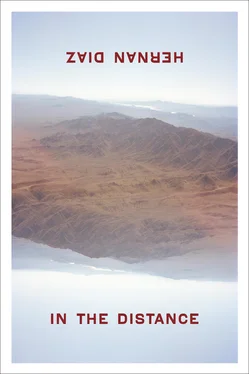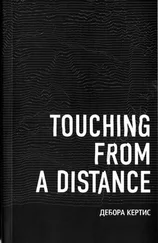The sun, burning deep into his neck, woke him up from a nightmare in which he was being beheaded. It was noon. He had never made it to the pond. His foot looked better, and he was breathing normally. He drank some water and looked around his camp. For months, he had led a crawling existence in those bushes, hoping that by staying there, without actually deciding anything, he would return, through a motionless path, to the peace of an inanimate state. Yet, when the gift of death had been presented to him, he had used every single one of his poisoned muscles to push it away. Remaining in his degraded condition after this realization was impossible.
He struck eastward as summer came to an end.
Fall hardened into winter. Håkan had marched on slowly, taking advantage of the last temperate days to compose himself before the inevitable encounter with travelers and settlers. He was glad that by the time he saw the first sign of civilization, it was cold enough for him to wear his coat. It made him feel safe. With each turn of his body, the lion merged, like a fabulous creature, with a fox, a hare, or a gopher. Around the neck and down the chest, the snake’s silver streak.
Some cows surfaced and sank on the horizon.
It was the first time he saw cattle out on the plains, away from the trail. After a while, however, the herd turned in Håkan’s direction. He stopped. Moos and bells. As he was wondering what to do, the drove changed course again, slouching along the skyline. Some time later, a group of riders, shimmering in the distant gleam, came into view—the first human forms Håkan had seen in many seasons. He knew that the wranglers had spotted him, too. They may have hesitated for a moment, but never halted, and soon they were out of sight.
A few days later, Håkan saw a city.
He was unable to tell at what point the road had appeared under him. By splitting them in half, the dusty stripe abolished the sense that the plains were infinite. There was now this side of the road and that side of the road. And at the end of it lay the city.
Several riders, wagons, and even carriages passed him in both directions. He kept his head low and never greeted anyone back. Even if he fixed his eyes on the dirt, he could feel the turning heads and the staring eyes. Like a froth corroding his organs, terror rose within his body. Each time he was about to turn around and gallop away in fright, he forced himself to think of his squalid shelter in the bushes and the bestial life he had led there. If he did not press on, that would be his only other option.
Chin on chest, Håkan made it into town and proceeded down its main street. He could see the small city dissolve back into the plains a few blocks down. The furtive glances from under his brow revealed buildings not too different from the ones in Clangston—simple wooden boxes of up to three stories high, most of them white or unpainted—except for the fact that here, most houses were older than the people walking around them. A few grander buildings were made out of brick. Håkan realized that those were the first brick constructions he had seen in all his years in America. Another source of surprise was the unreasonable profusion of flags, banners, pennants, and banderoles of all kinds and sizes. Later, he would learn that the white stars on a blue field with the red and white alternating stripes was the ensign of the United States of America.
A block or two down the avenue, something changed. The people who until then had stopped to gawk at him now scurried away at his sight, seeking refuge in shops and taverns. Still, Håkan felt everyone staring from behind the dark windows. Was it that he was filthy and wild? Was it his lion coat? Was it that they saw a murderer? To his surprise, his fear momentarily gave way to indifference. He did not mean to stay there. The town, a mere obstacle on his journey east, was just an opportunity to try himself in society, and it would fall behind him forever in a matter of instants.
A saddlery caught his eye. After so much tanning and stitching, he had developed an interest in leather and was curious to see what could be achieved with better materials and tools. There was a pair of boots in the window. Håkan was practically barefoot—his outgrown moccasins, already unable to prevent numbness and chilblains during the previous winter, had been replaced by precarious canvas and leather wraps. Also, New York could be closer than he thought, and he did not mean to go through that big city and meet his brother shoeless. Although these arguments barely convinced him, he tethered his animals and walked into the store, hoping that the money Lorimer had given him would be enough. The delicate bell on the door startled him. As soon as he walked through the threshold and smelled the perfumed wax, he knew he would not be able to stay. The neatly displayed goods, the polished curves of the counter, the lustrous leather, the general sense of order overwhelmed him. He had never bought anything at a shop in his life. What had made him think that going into a store and conducting a transaction in a currency he was unfamiliar with (and was unable to read) was the best idea for his first exchange after such a long period of solitude? As he was getting ready to leave, a door in the back opened, and through it came the shopkeeper, who stopped at the sight of the stupendously tall man. The smile he had brought from the back room did not match the awe that now widened his eyes. Håkan was about to turn around when he saw his own picture on the wall. Could it really be his face? It seemed to be his portrait, under some bold letters and numbers. The drawing was rudimentary, and he had not seen his own face in a long time, but his main traits were there. Surely, it was a coincidence—it had to be someone else. Still stunned by the resemblance, Håkan turned around and walked out.
The street was now deserted, except for three men with their rifles pointed at him.
“Your gun.”
The man who had spoken held out his hand. His hollow cheeks were pitted with smallpox, and his head seemed to simply rest between his shoulders like a ball on a shelf. No neck. A silver star shone on his narrow chest. His voice reminded Håkan of the squeaky tones Linus sometimes used for imaginary forest people, witches, and twig dolls.
“No gun,” Håkan said, surprised to find that language worked.
“Right. And how did you get that lion?”
“I got it.”
“You got it?”
“Yes.”
“Without a gun?”
“Yes.”
“With your bare hands?”
“Yes.”
The man sighed, annoyed, and with a nod asked one of his assistants to search Håkan. One of them made the gesture of walking over, but stopped, visibly afraid, before even setting out. The man, now more irritated, patted Håkan down himself.
“What’s your name?”
“Hawk.”
“That’s him all right,” the man told his companions.
At first the men had been intimidated by Håkan’s height, and now that they knew his name, they seemed even more unwilling to approach him. The man with the star stepped back and all of a sudden hit Håkan in the stomach with the butt of his rifle. He fell in the dirt and was kicked until he no longer moved.
He woke up clutching a fistful of dirt, which made him think that he was still on the street, but he lay on a wooden floor, and gradually, the narrow space resolved itself into a prison cell. Over the scent of lamp oil, it smelled of tobacco, onions, and dogs. His hands were fettered to a metal rod, which, in turn, was chained to the wall. His feet were cuffed. Boots walked about beyond the bars. When he tried to look up, pain brought his head back to the ground. He feared things had been broken, torn, and punctured inside him. Quite some time must have elapsed since the beating, because the blood on his skin and clothes had coagulated into small desertscapes. Slowly, one by one, he tested his limbs. They hurt but did not seem to be fractured.
Читать дальше












